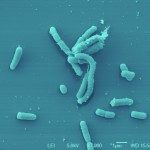Lien vers HAL – pasteur-04087871
Lien DOI – 10.1042/bio_2023_109
The Biochemist, 2023, 45 (2), pp.1-5. ⟨10.1042/bio_2023_109⟩
Plague is an often fulminant and fatal disease caused by the bacterial pathogen Yersinia pestis. Three major historical plague pandemics have heavily influenced human societies, and recent evidence demonstrates that plague has also influenced human biology. Plague is still endemic in several continents and remains a potential public health risk. In this article, we examine the current situation of plague around the world and the different players that participate in plague ecosystems. We discuss in particular the recent research that allows us to understand plague in pre-historical times, as well as how past pandemics have modulated the evolution of human immune genes. We also highlight future challenges that await us in the study of this deadly but fascinating disease.




